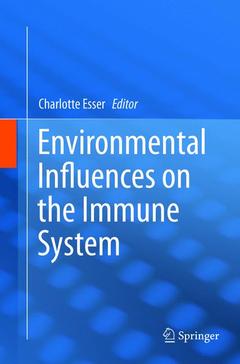Description
Environmental Influences on the Immune System, Softcover reprint of the original 1st ed. 2016
Coordinator: Esser Charlotte
Language: English
Subjects for Environmental Influences on the Immune System:
Keywords
Allergy; Autoimmunity; Danger of UV; Immunotoxicology; Microbiom; Nutrition and Health
Publication date: 03-2019
Support: Print on demand
Publication date: 02-2016
Support: Print on demand
Description
/li>Biography
/li>Comment
/li>
This book brings together articles on the overarching theme of how the environment shapes the immune system.
The immune system is commonly assumed to respond to harmful pathogens such as bacteria and viruses. However, harmless bacteria, chemicals, stress, normal food and other factors can also trigger, shape or interfere with the immune system, often producing adverse effects. Yet, it is also becoming increasingly accepted that some of these interactions are physiological and necessary for a healthy immune system.
Examples of negative effects include the immunosuppressive effects of UV irradiation, or the immunotoxic effects of man-made chemicals such as polycyclic aromatic hydrocarbons. Autoimmunity or allergies can be the adverse consequences of interaction between the immune system and chemical compounds such as drugs. Positive effects can come from natural exposure levels to bacteria, healthy life-style or the diet.
Charlotte Esser is Professor of Immunology and group leader at the Leibniz Research Institute for Environmental Medicine (IUF) in Düsseldorf, Germany. Her Research focuses on the adverse or beneficial consequences that low molecular weight substances (such as environmental toxins or dietary supplements) have on function and differentiation of the immune system in mice and men. A main focus lies on the analysis of the arylhydrocarbon receptor.
A comprehensive work on the effect of the environment on the immune system
Unique book in this field on the market
Gives a basic overview of research models, mechanism and structures as well as a thorough insight into professional immunology
These books may interest you

Molecular Immunotoxicology 163.43 €



